October 2007 Volume 10 Number 4 - Educational Technology ...
October 2007 Volume 10 Number 4 - Educational Technology ...
October 2007 Volume 10 Number 4 - Educational Technology ...
You also want an ePaper? Increase the reach of your titles
YUMPU automatically turns print PDFs into web optimized ePapers that Google loves.
could be to give the trainees a chance to create an E-OLC that is characterized by active participation, collaboration<br />
and dialogue. Furthermore, according to Lankshear & Knobel (2006) there is a demand for new ways to train future<br />
teachers that will face new teaching and learning challenges with young children and students that are growing up<br />
with mobile devices and new media. To conclude, in net-based teacher training all these ideas and challenges are<br />
intertwined. It is therefore important to continuously research and develop net-based teacher training programmes if<br />
teacher trainees of today shall be able to meet the demands from young children and students of tomorrow.<br />
The Context of the Study<br />
The context of the study was a net-based teacher training programme provided by a university in northern Sweden.<br />
This study is a follow-up investigation from a larger case study concentrated on the issue of training teachers through<br />
technology (Lindberg & Olofsson, 2005). The participants in this study were teacher trainees in the aforementioned<br />
net-based teacher training programme. The programme investigated was three and a half to four and a half years<br />
long, depending on the teacher trainees’ choice of degree. The programme was mainly aimed at training teachers to<br />
be able to teach in sparsely populated areas in Sweden. The programme was mainly conducted via a net-based<br />
learning environment and only a small number of on-campus gatherings were included. The trainees were divided<br />
into smaller study groups and the net-based learning environment enabled, throughout the programme, collaboration<br />
and communication both synchronously and asynchronously without meeting physically. The net-based learning<br />
environment used in the programme was WebCT and examples of learning tools are email, chat, discussion groups<br />
with threaded discussions, electronic portfolios, study-group conferences, and students’ café.<br />
The study group in this paper should be regarded as an E-OLC. The trainees were continuously encouraged by the<br />
educators to actively use the net-based learning environment. This was for example stressed in the study-guides<br />
provided for the teacher trainees. The teacher training programme was aimed at educating future teachers with the<br />
competence of both handling ICT and on using it in order to get in contact with other persons in the surrounding<br />
society that could enrich their own practice.<br />
Data Gathering and Procedure<br />
The total number of teacher trainees enrolled at the time of data gathering was 77. All trainees were asked to be<br />
interviewed. A group of 22 trainees volunteered, but out of these, three were unable to take part and the interviews<br />
were carried out with the remaining 19. The trainees that were interviewed were between 20 and 50 years old, 13 of<br />
the trainees were female and 6 were male. The interviews were semi-structured and each interview was conducted in<br />
relation to a pre-specified interview guide. The study was conducted in spring 2004. The interview guide was divided<br />
into 4 different themes, containing 15 questions in total. Before the interviews, each trainee was given an interview<br />
guide with the intention to allow the trainees to prepare. Each interview lasted for approximately 25 to 60 minutes.<br />
For this paper, analysis was conducted on data from the theme concerning educational issues. This theme included<br />
four questions and was constructed with the intention to function as a basis for an open discussion. All answers were<br />
recorded on tape, transcribed and analyzed. Each interviewee was given the opportunity to comment on the<br />
transcripts before the analysis. The questions included in the theme were as follows:<br />
A student in your study group is having difficulties keeping up in the programme and therefore needs help. What<br />
are your thoughts about being involved in and taking responsibility for the situation?<br />
There is a new student in the study group. What are your thoughts about being involved and taking responsibility<br />
for helping the student to feel at ease in the new group?<br />
What are the important issues that you discuss in the programme?<br />
What have you learnt in the programme that is especially important for the future?<br />
Analysis<br />
The analysis used an approach inspired by hermeneutics (Gadamer, 1976). The approach intended to preserve the<br />
complexity of the educational setting that was researched. In the analysis, three different categories were constructed<br />
and presented. The categories emanated from the interpretations of the transcribed data. The categories should not be<br />
seen as objective truths or as categories capturing actually existing practices within the net-based teacher training<br />
31

















